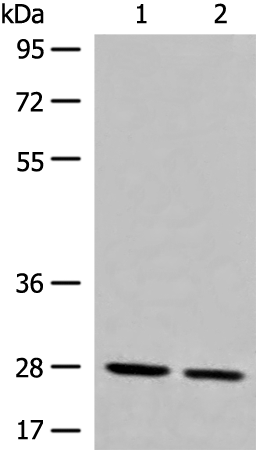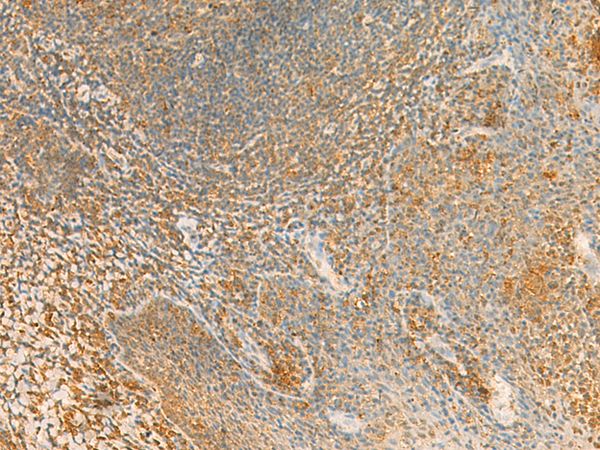

| WB | 咨询技术 | Human,Mouse,Rat |
| IF | 咨询技术 | Human,Mouse,Rat |
| IHC | 1/50-1/300 | Human,Mouse,Rat |
| ICC | 技术咨询 | Human,Mouse,Rat |
| FCM | 咨询技术 | Human,Mouse,Rat |
| Elisa | 1/5000-1/10000 | Human,Mouse,Rat |
| Aliases | HH7; GRHR; LRHR; LHRHR; GNRHR1 |
| WB Predicted band size | 38 kDa |
| Host/Isotype | Rabbit IgG |
| Antibody Type | Primary antibody |
| Storage | Store at 4°C short term. Aliquot and store at -20°C long term. Avoid freeze/thaw cycles. |
| Species Reactivity | Human, Mouse |
| Immunogen | Synthetic peptide of human GNRHR |
| Formulation | Purified antibody in PBS with 0.05% sodium azide and 50% glycerol. |
+ +
以下是关于GNRHR(促性腺激素释放激素受体)抗体的3篇参考文献,简要概括其内容:
---
1. **文献名称**:*Autoantibodies against gonadotropin-releasing hormone in patients with idiopathic hypogonadotropic hypogonadism*
**作者**:Chanson P. et al.
**摘要**:该研究在特发性低促性腺激素性性腺功能减退症(IHH)患者中检测到抗GNRHR自身抗体。这些抗体可能通过干扰受体信号传导,导致促性腺激素分泌不足,进而引发性腺功能异常和不育。
2. **文献名称**:*Anti-gonadotropin-releasing hormone receptor antibodies in primary ovarian insufficiency*
**作者**:Silveira L.F.G. et al.
**摘要**:研究发现,部分卵巢早衰(POI)患者体内存在抗GNRHR的自身抗体。这些抗体可能破坏下丘脑-垂体-卵巢轴的功能,导致卵泡发育障碍和雌激素水平下降。
3. **文献名称**:*GnRH receptor autoimmunity: a novel cause of secondary amenorrhea*
**作者**:Collu R. et al.
**摘要**:报道了抗GNRHR抗体与继发性闭经的关联。实验表明,抗体可阻断GnRH与其受体的结合,抑制黄体生成素(LH)和卵泡刺激素(FSH)的释放,从而影响生殖内分泌稳态。
---
以上文献均聚焦于GNRHR抗体在生殖内分泌疾病中的作用机制及临床影响,涉及性腺功能减退、卵巢早衰和闭症等病理过程。
**Background of GNRHR Antibodies**
Gonadotropin-releasing hormone receptor (GNRHR) is a G protein-coupled receptor critical for reproductive function. It binds GnRH, a hypothalamic decapeptide, to regulate the release of pituitary gonadotropins (LH and FSH), which drive gonadal steroidogenesis and gametogenesis. GNRHR dysfunction is linked to disorders like hypogonadotropic hypogonadism, infertility, and hormone-dependent cancers.
GNRHR antibodies are autoantibodies targeting this receptor, often implicated in autoimmune or idiopathic infertility. In rare cases, they disrupt GnRH signaling, impairing gonadotropin secretion and leading to hypogonadism. Such antibodies may arise spontaneously or due to molecular mimicry from infections, though their prevalence and exact mechanisms remain poorly understood.
Research on GNRHR antibodies has expanded in reproductive immunology, particularly for diagnosing autoimmune infertility or monitoring GnRH-based therapies. Experimental models using anti-GNRHR antibodies help study receptor function and GnRH signaling pathways. Therapeutic applications are also explored, including antibody-based targeting in prostate or ovarian cancers. However, clinical relevance is still emerging, requiring further validation of their diagnostic and therapeutic potential.
In summary, GNRHR antibodies represent a niche area bridging immunology and endocrinology, offering insights into reproductive disorders and novel treatment strategies.
×